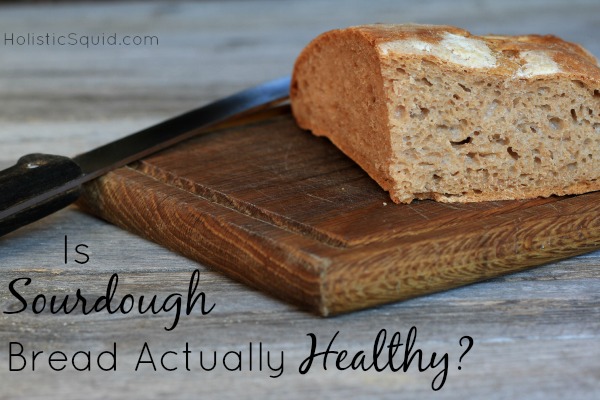
Is sourdough bread healthy? I've written about why I prefer white rice over brown, so you may or may not be surprised to read that I actually prefer white bread too. I found that real sourdough white bread is the easiest for me to digest. In this post, Naomi Huzovicova shares why sourdough is WAY better than conventional bread and may actually be good for you too. ~Emily
In the last few years, bread has gotten a bit of a bad reputation. The popularity of gluten-free and paleo diets are supported by legions of followers, experts, and best selling books like Wheat Belly and Grain Brain.
Not all bread is created equal, however, and some believe that traditional preparation using a sourdough starter can negate the detrimental effects of wheat and other grains.
What is sourdough?
Sourdough bread is made by fermentation. Flour and water are mixed to make a starter, or levain, colonizing healthy bacteria and yeast. These microorganisms feed on the flour, breaking down the grain. Carbon dioxide results from the interaction of the yeast and bacteria, and causes the dough to rise.
For the benefits of sourdough, the dough must undergo a slow fermentation process with no commercial yeast added. The amount of time necessary changes depending on type of flour used, temperature, and hydration (amount of water), but a general rule of thumb would be a minimum of 12 hours at room temperature.
Why true sourdough bread is better
True sourdough bread ferments the flour, with a number of effects that render bread healthier and easier to digest. Besides being better for you, it tastes amazing, too.
Sourdough reduces phytates
Phytates are found in whole grains (as well as other whole seeds and nuts) and are the bond between minerals and phytic acid. When bound to phytic acid, we cannot absorb the minerals in food, even though they are included in the nutritional profile of a whole grain. The phytate bond must be broken in order for us to digest them.
When dough undergoes sourdough fermentation, the enzyme phytase breaks those bonds. If the acidity of the sourdough dips to pH 5.5, 70% of the phytate is reduced, availing minerals for assimilation, including phosphorus in the phytic acid. Studies show that reducing or increasing phytates has a direct impact on the assimilated amount of magnesium, iron, and zinc.
Helps the body digest protein
Not only do phytates bind with minerals, they also inhibit the enzyme trypsin, a digestive enzyme that breaks down protein. When the phytate bonds are broken, then the body can digest protein properly.
When proteins are not properly broken down into peptides and then amino acids, they can irritate the gut wall, leading to inflammation and ‘leaky gut syndrome.' One of the main proteins in wheat flour is gluten.
Fermentation breaks down some gluten compounds
The action of the lactobacilli on the dough starts the breakdown of gluten. Even if you don't have celiac disease or gluten intolerance, gluten is still a large molecule and difficult to digest.
Gluten is made of two components, gliadin and glutenin. Gliadin negatively impacts those with celiac disease; glutenin provides the elasticity of gluten. Lactobacilli in sourdough break down the gliadin but not the glutenin, meaning, they break down the problematic part of gluten but not the structural part.
In one study, a four hour ferment managed to break down 80% of the gliadin that would be broken down in 8 hrs. Another study found that under certain conditions, a sourdough culture could break down the gliadin proteins enough that they would not be toxic to those with celiac disease.
This is not to say that celiacs can go eat any sourdough; these analyses and experiments were made under controlled circumstances. These studies do, however, demonstrate the power of the bacteria and yeast of sourdough in breaking down gluten and rendering bread more digestible.
Sourdough stabilizes blood sugar levels
A comparison of four types of bread (white, whole wheat, whole wheat + barley, white sourdough) on blood sugar levels found that white sourdough had the least rise in blood sugar and insulin levels of participants. Not only that, but those who had white sourdough bread for breakfast continued to have low blood sugar levels even after lunch.
Scientists aren't exactly sure why sourdough bread has such a stabilizing effect on blood sugar levels, but they think it may be because a sourdough fermentation changes the structure of the carbohydrates in bread, causing the body to assimilate it more slowly. The starches in the dough are predigested by the bacteria and yeast, making it easier on the digestive system.
Lasting benefits of probiotics after baking
Raw sourdough dough is full of beneficial microorganisms, and even though they are killed by heat during baking, they still may be of beneficial value to health.
Preliminary studies show that these organisms can reduce the incident of the common cold, shorten the duration of diarrhea, and reduce inflammation.
Fermentation protects against mold
A number of acids produced by the Lactobacillus sanfrancisco, one of the main bacteria of a sourdough starter, have an antimold effect. Conventional bread can spoil and harbor mold before it is visible, and eating mold can be quite harmful. Sourdough bread, on the other hand, rarely molds.
Sourdough keeps you feeling full
Ever had a piece of bread and butter, and then another…and another? It can be easy to gorge on carbohydrate rich foods, and never feel full.
Sourdough bread, on the other hand, has an increased amount of satiety–that is, you feel fuller longer after eating it. I have experienced this myself. A few sourdough pancakes keeps me full all morning, while normal pancakes quickly leave me hungry. The benefit of increased satiety is that you can consume fewer calories without feeling hungry.
As you can see, traditional bread preparation is a far superior option to our modern short cuts. Some people find that, while they can't tolerate conventional bread, they can enjoy true sourdough bread without a problem.
Try these sourdough recipes: How to Make a Starter, Sourdough Pancakes, Sourdough Lemon Poppy Seed Muffins
Is sourdough bread healthy for YOU? What has your experience been?
The closest Naomi has gotten to her dream farm is growing live bacteria in jars and wrangling her four children, including twins. A Canadian who now lives in Slovakia, Naomi writes about traditions, food, and life in Slovakia (as well as some pretty strange food) at Almost Bananas.



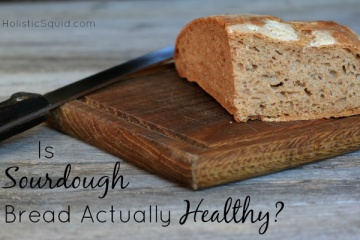
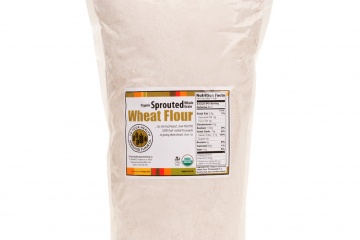



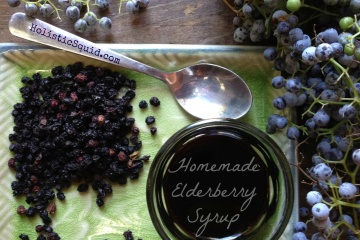
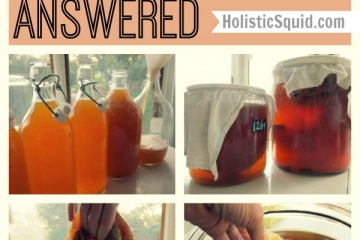
Love it! I adore sourdough and I finally got my husband on board – so now it’s the only bread in the house. 🙂
Yes, once you convert there is no going back!
Great information – I love sourdough bread, but had no idea about it’s benefits. I do know it was recommended to me when I was having gallbladder issues, and it was one of the few foods I could tolerate while experiencing a flare-up
So interesting that it was one of the few foods that you could tolerate while experiencing a flare-up. That predigesting must make it easier on the body.
I had not heard of this until last week. A 90 year old lady that I have known a few years brought a loaf of bread to our office. She said she makes it once a week for hospice patients. She said this seems to be the only thing they can eat with ease. She got her first sourdough starter 40 years ago. Her family plans on taking it over for her when she decides.
What a sweet lady and a great service! I love hearing that sourdough bread is easier to tolerate for those with health issues.
The fun is to adapt yeast breads to sourdough! I make everything from English muffins to panettone with my sourdough starter. I find store bought and yeasted breads inedible.
Yes! I mostly make everything flour based as sourdough as well, and some of those recipes will be forthcoming. Knowing the good stuff makes it hard to eat the regular stuff.
May I please suggest to actually read the Italian study you quote? I am sorry but this statement “Fermentation breaks down gluten” is absolute bullshit. Sorry that I react so extreme but I am an Artisan baker and I can tell you that this claim is not true. I actually can’t hear it anymore. The Italian study gets referenced all over the web. In this study they TREATED WHEAT WITH AN ENZYME and then EXTRACTED LACTIC BACTERIA FROM SOURDOUGH and added it to the TREATED WHEAT. Which resulted in an 80% less gluten content. (CAPS for emphasis, not yelling)
Let’s apply some common sense, shall we? Gluten provides structure in a dough. It captures the fermentation gases which makes the bread light and fluffy. So far we are on the same page, right? Now if the claim would be correct and sourdough would reduce gluten by up to 80% wouldn’t all sourdough breads be like a brick? If you remove 80% of gluten you would have to replace that gluten with an emulgator. As it is done with gluten free breads. This would be like xanthan gum or similar. By the way, most emulgators are suspected to cause Irritable Bowel Syndrome. Just sayin’
So yes, there seems to be evidence that lactic bacteria from sourdough can educe gluten by 80% when added to wheat which was treated with an enzyme. If this technique would be used in making bread the gluten would have to be replaced with an emulgator to get a light fluffy crumb. So where exactly would be the advantage of this?
Amazing how science combined with common sense works, eh?
Thank you for your vigilance in making sure that correct information is shared on the web.
We both oversimplified the issue by referring to the breakdown (or not) of gluten. Gluten is made of two components, gliadin and glutenin. Gliadin negatively impacts those with celiac disease; glutenin provides the elasticity of gluten. In the study quoted, lactobacilli broke down the gliadin but not the glutenin. So, sourdough breaks down the problematic part of gluten but not the structural part.
Furthermore, 80% does not refer to the amount of gliadin that was hydrolyzed, but that 80% of the total that was broken down in 8 hrs happened within 4 hrs.
The enzyme was used to make a substrate in order to screen 55 strains of bacteria by analyzing the proteolytic activity of each strain. As a result of those tests, four were chosen to be used in a traditional sourdough fermentation process. The protease enzyme, therefore, was not used on the wheat flour but only in order to choose which strains of bacteria to use.
They did extract the lactic acid bacteria from the sourdough – this is what I was referring to when I mentioned controlled circumstances. I should have been more explicit that methods were used not available to the home baker, but as all the bacteria are native to sourdough, they would be in any home baker’s sourdough preparation. Indeed, I would speculate that a normal sourdough dough would actually be stronger, as all the bacteria would be working on the flour and not each in isolation.
As I stated in the post, however, I used this study not to say that sourdough bread has no gluten (specifically gliadin) but to demonstrate the power and effect that fermentation has on our food, and indirectly on our bodies when we eat that food.
The post has been edited to be more precise.
Excellent respectful rebuttal! Peter’s comment and then your rebuttal were very helpful and shows that you and some of your readers (Peter) are interested in the true detail and deeper studies behind your beliefs! I am certainly going to try my hand at making sourdough bread now as you have convinced me that it would be healthful to do so! Bravo you two!
Great job on diffusing a possibly nasty bit of comment there as well. I seldom read comments on the net because of some of the downright disgusting things people write nowadays! Rude, disrespectful and hateful are not the way I was raised but seems to be the way many others were raised :(. Thanks for responding respectfully.) I have bookmarked your blog and will visit often and share with others ; )
Wii like the recipe to know which kind of
flour it’s used
Recipes will be coming, including how to make a sourdough. Any grain can be used, although gluten free grains require a little different care. I use mostly rye and spelt, as those are the grains I both like and have access to, but I’ve used regular hard wheat as well.
Hi there! I have a (probably stupid) question, but I haven’t made sourdough before, even though I’m planning to soon – don’t you add unfermented flour to the starter? Wouldn’t that add phytates and unbroken down gluten molecules to the recipe? Or does something happen to those molecules as the dough is rising? or while baking? I’m assuming it does *something* since people aren’t negatively affected after eating it. We are in the process of moving out of state and I can’t wait to try sourdough after I’m settled! Do you have a favorite company to get your starter from? Or do you use a certain flour and make your own?
No question is too little to ask! The starter itself is the fermented part – so, you add regular flour of choice to the starter, as as it sits and rises it is fermenting and doing all the predigesting. I make my own starter, and the recipe will be coming soon!
Thank you so much for your reply. Looking forward to seeing your recipe. 🙂
What is your recipe for sourdough bread. Thank you! ????
I’ve got a series coming up with different recipes planned, although bread will be a bit later. Muffins, pancakes, and more – stay tuned!
Great article! Now what about a good sourdough recipe?
Thanks! Recipes coming!
Thank you for this post! I looked at Almost Bananas blog but can’t find a recipe for sourdough bread (pancakes or anything else!). Can you post one for those of us interested in trying it? Also could you provide links to organic sources of white flour since non-organic wheat is sprayed with glyphosate just prior to harvest here in the States?
I will post on here soon, starting with the starter and moving into other baked goods. Stay tuned. I’ll have to leave recommending a source for flour to Emily, as I don’t live in the States and therefore can’t recommend any particular brand.
Thank you for sharing. Do you have recipes for the starter and the bread? If so, please share! I’ve been looking for a “tried and true” recipe. Thanks again!
Yes, recipes coming up!
I have had many food/health related issues in the last two years and had given up all flours and most grains. Recently I made my own sourdough starter using organic flour and have now been making bread and english muffins with this. I am able to eat these items without any adverse reactions- it’s been amazing!
So great to hear that! Being able to eat sourdough products certainly opens up the range of foods one can eat when having health issues.
Hi Wellness mama and readers. I have been dying to try a sourdough recipe. I have a question about buying sourdough. I am assuming any or most for sale at the grocery store or maybe even a bakery are not real sourdough right? I have never seen it at a bakery, but recently came accross a company from California that claims their sour dough was made by slow fermentation. I purchased it to try it out because I love the flavor and have been to scared to try baking it. Is the any way to tell a good bread from one that’s not? My hubby and I want to switch to better breads or baking our own, but aren’t sure where to start.
Whenever we source our food from other people, whether the grocery store or a local farm, it requires a fair amount of trust. The best thing to do is to call or write the bakery, asking them what their process is and what ingredients are included. A slow fermented sourdough will have heft to it and have a sour tinge, although it may not be as sour as you expect. Whole grain breads will be more dense than white. Basic ingredients should be flour, water, salt, starter, and any flavours (herbs, seeds, etc). I’m afraid I don’t have a specific bakery to recommend, but I will be teaching you how to make your own, and I’ll be here to walk you through the steps and help with any questions you may have.
Thank you so much for this article. I stop eating bread because it caused a spike in sugar levels or acid reflux. I have tried many kinds including Ezekiel but no success. Can’t wait until you post recipes for Sourdough. I will definitely give this bread a try. What about store bought Sourdough at Whole foods, do you think that would be any good?
I hope sourdough will work you for! As I don’t have access to Whole Foods, I’m afraid I can’t comment on their sourdough bread.
Is there a recipe somewhere that I am missing? How do you make the bread?
Nope, not missing anything! This was just an informative article, recipes will be coming!
YES, a thousand times, YES! Thank you so much for this post. I love every word, and am a major sourdough lover. I use my starter all the time and am obsessed with it. I am gluten intolerant and NOTHING I make with my sourdough causes even the slightest twinge in my gut. I love seeing the word spread – we don’t have to be afraid of grains – just have to learn how to prepare them the right way.
Thank you 🙂 I’m of the same mind. So good to hear that you can handle sourdough even though you are gluten intolerant. Preparation is really the key!
I just started on the paleo diet and want to know if I ‘can’ eat sourdough bread while on paleo diet. I have a starter that I could try to revive if I can. Thanks in advance.
There seems to be a number of opinions as to what defines the Paleo diet. Generally, gluten containing grains are not considered to be Paleo. I really like Chris Kresser’s approach of the Paleo template and finding out what works for us individually, instead of following a predefined diet that may or may not be optimal for you. http://chriskresser.com/beyond-paleo-moving-from-a-paleo-diet-to-a-paleo-template/
I have heard this about sourdough b/c of the fermentation, but I wonder about sprouted grain breads and flours. What is your understanding about them? I don’t know if I have the energy right now (17mo twins & 7mo preggers w/ #3) to make bread, sourdough or otherwise. Plus, I am hot all the time anyway – I cannot imagine baking in the summer. Help? 🙂
I hesitate to give an opinion on sprouted grains and flours. While I understand them to be easier to digest, I haven’t actually looked into studies or the science behind them.
I can totally understand about the twins though! With 17mo twins and expecting the next one, I would be in survival mode. I still kind of feel like I’m in survival mode, even though my twins are now 3.
The bread I make is no-knead, however, and while still hot to bake, only takes 10-15 min of active time. I’ve heard of, though haven’t tried, baking bread in a crock pot to avoid a hot oven in the summer. The hardest part of sourdough is getting into the rhythm of using it, but it feels like it’s less work to make sourdough goods because the work is broken up into short spurts.
Good luck with the next few months!
Oh, and I’d love some recipes for muffins, pancakes etc for when energy comes back and heat goes down. Or for a damp, rainy day. 🙂
I HAVE A brown rice sourdough starter that i purchased online to so i could use the brown rice flour instead of wheat. would that have the same benefits as regular sourdough? thx
It should, although I found that the gluten free starter I had for a while didn’t get quite as acidic.
I’ve stopped eating bread for the sake of my gut. But I’m tempted to try sourdough. But if I buy sourdough in a store, is it made well enough to provide the benefits described in your article?
It completely depends on the bakery/person making it. You have to contact the makers and ask them how they make it, particularly how long they let it ferment.
Should I be concerned about whether the flour is organic or not? A place by my house makes fresh, preservative free sourdough bread and I love it, but I doubt they use organic flour.
Great article! I am recently diagnosed with Hashimoto’s and reading about it scares me because it mentions to give up gluten 100 percent forever. Which I found hard to take, as maybe I am not at all sensitive to gluten. After hours on the internet, I am now thinking that glyphosate may be the real problem in food. So I am looking into alternatives. It seems that sourdough may be a great solution. I wanted your opinion on bread sold at Le Pain Quotidien, look at the way they make their bread, that is also good right? http://www.lepainquotidien.ae/our-bread/
I do not have a breadmaker and little time, that is why i want to buy it somewhere.
many thanks for your opinion.
I’d like to know if anyone has made sourdough from just coconut flour and if it can be done. I’ve tried it with a gluten free all purpose flour mix with only a few successes so I was wondering about coconut flour…..any ideas or does anyone want to try?
I haven’t tried it or heard of it, but I’m skeptical of it working. Grains have carbohydrates that the bacteria/yeast eat, coconut flour is very low in carbs. But, there are bakers who manage to make delicious items with strange ingredients, so maybe it can be done. It would probably require a fair amount of experimentation. And different proportion of water to flour.
I never knew that sourdough bread helps break proteins into peptides and amino acids. It would make sense to have something in your diet that helps break down food in this way. You would probably also want to consider finding sourdough bread that is organic for more added health benefits.
I think that’s really cool that sourdough bread is able to help you have low blood sugar throughout the day when you eat it for breakfast. I love bread, but I want to make sure that I’m not eating too many carbs and things that aren’t that good for me. So I’m happy to see that sourdough fits that mold. I’ll have to find somewhere to buy some fresh bread from like this.
How are you not over rising your sourdough if it’s at room temp for 12 hours? I’ve only been able to let my dough rise that long if it’s done in the fridge. Do enough of the phytates neutralize when the fermentation is done at the lower temp of the fridge?